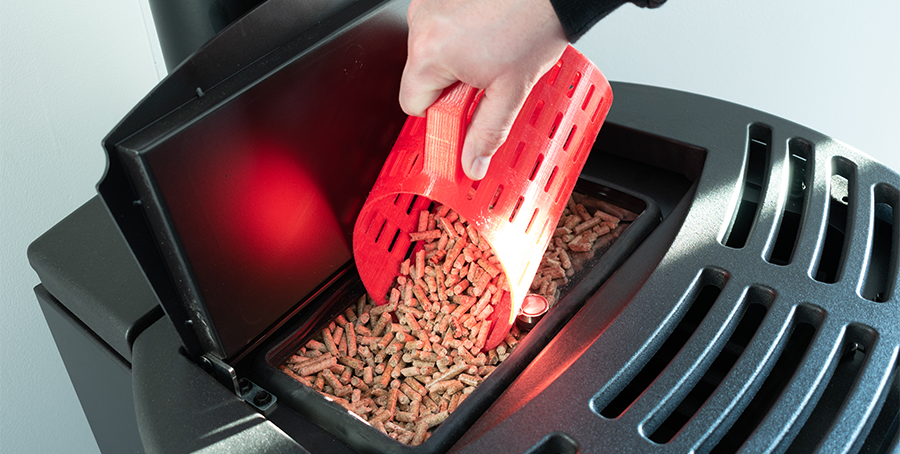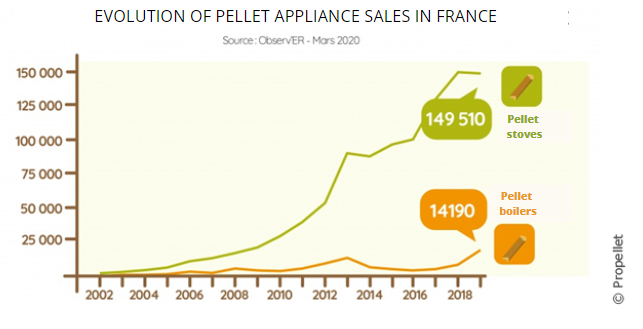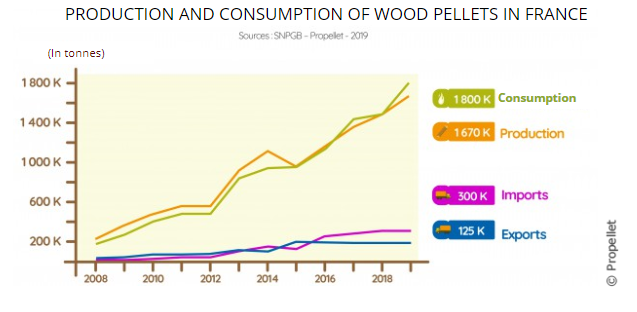Wood pellets are more relevant than ever
Tensions on supply, availability, pellet prices... In recent months, the wood pellet market has been particularly lively, observed and commented on. We propose to look back on this year, which is really unlike any other, and then to outline some perspectives. You will see that wood pellets are far from being out of the game, quite the contrary.

2022, a record year for wood pellets
Until 2020, the pellet market (fuel and equipment) follows a rather steady and smooth progression. The increase in the number of pellet heating installations in France is matched by an increase in fuel production to meet the growing demand.


The year 2021 marks a turning point in the young history of pellets, with demand rising sharply:
- •200,000 pellet stoves are installed in 2021 compared to about 150,000 in 2019 (the activity in 2020, a year marked by the health crisis and lockdown episodes, is difficult to compare)
- •30,000 pellet boilers are installed in 2021 against 15,000 in 2020
We are now emerging from an unprecedented global health crisis, and the sharp acceleration is due to a number of factors including:
- • Growing consumer interest in renewable energy, including wood energy;
- • The "pellet" offer is growing and continues to be structured;
- • The proven reliability and energy performance of the systems is leading to a growing confidence among private individuals;
- • Financial support schemes available to encourage energy renovation in housing;
- • Tariffs for 'historical' energy sources are still rising sharply (fuel oil, gas, electricity);
- • The planned end of oil-fired boilers for which pellet boilers are an alternative...
Activity is sustained, but the lights are on green with order books well filled among craftsmen. But in the spring of 2022, the outbreak of the conflict in Ukraine will accelerate things even further, and a new crisis, this time an energy crisis, begins...
The impact was immediate. Taken by storm by consumers worried about not being able to get supplies for the winter, wood pellet is facing, from April onwards, peaks in demand never seen at this time of year, leading to imbalances between supply and demand. Many individuals anticipated their purchases, others overstocked, and prices soared, reinforced by two other factors:
- • The increase in wood cost as a raw material (a phenomenon observed in furniture and construction)
- • Rising production costs for manufacturers (energy, transport, packaging, pallets, etc.)
In addition to the increase in prices throughout France, the impression of an insufficient supply of fuel to satisfy all the demand - an impression relayed on the networks and in the media - ends up convincing many consumers to turn away from wood pellet appliances.
As if, after years of continuous growth, this short episode of turmoil, attributable to an unforeseeable surge in demand, had been enough to create mistrust among the French towards wood pellets, which had been very popular until now. And yet...
An accelerated development of the wood pellet industry
- However, the French pellet industry is still growing. The commissioning of new pellet production units and the ongoing development projects of historical French producers and new industrialists have already allowed and will allow the French capacity to increase in the years to come.
- The industry estimates that French production is capable of doubling by 2028 (from about 2 million to 4 million tonnes of wood pellets), enough to meet current and future demand.
- The difficulties encountered in 2022 will therefore only be a one-off episode, while the availability and prices of wood pellets should gradually be regulated (there are already decreases throughout the country).
Wood pellets still cheaper than electricity
While the price of pellets was rising (a rise that many consumers felt was unfair, especially as most had hoped to rely on one of the most stable and economical energies on the market), the price of other energies was not spared either, far from it.
In France, on 1 February 2023, the regulated tariff for electricity increased by a further 15% (more than 20 million households affected). This is a significant increase for French households in an inflationary context, but an increase contained by the tariff shield put in place by the State, since without the shield, the electricity tariff would have increased by almost 99.22%!
In the current energy landscape, wood pellets remain perfectly positioned, it remains a heating solution quite relevant and viable on the long term insofar as the electricity rates should not know a sustainable decline and where fossil fuels should disappear gradually.
Why is pellet heating still very much in vogue?
Still in doubt? Here are some points that should give you confidence in wood pellets:
- • The equipments are available (appliances and flues)
- • The fuel is available and the French offer continues to grow
- • It meets consumers' expectations: thermal comfort, energy performance, sustainable energy
- • The latest generation of equipment is perfectly in line with the RE2020 regulation
- • Prices for wood pellets (bagged and loose) will gradually regulate
- • Wood is still the cheapest energy
- • Pellet heating appliances (stoves and boilers) are still eligible for financial aid schemes, including MaPrimeRénov'...
To the question "Should you still install a wood pellet heater?", we answer "yes" without a shadow of a doubt. This method of heating (and wood heating in general) has a bright future, and if you are equipped with this type of appliance, there is no need to panic, the temporary fuel crisis seems to be improving.











